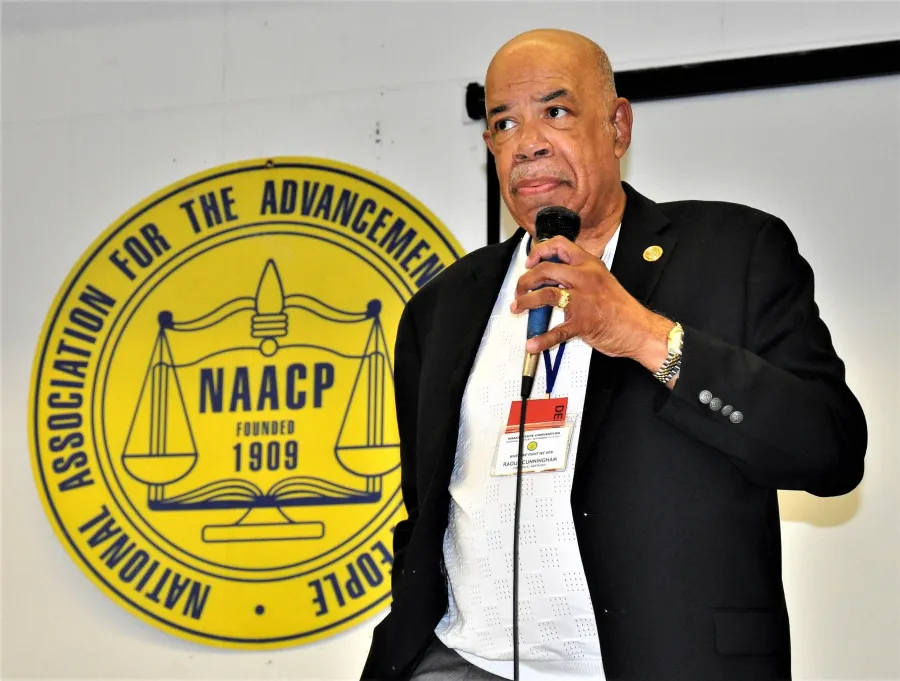'The unions and the NAACP go hand-in-hand.'

By BERRY CRAIG
AFT Local 1360
NAACP Kentucky State Conference President Raoul Cunningham of Louisville recalls that every Kentucky congressman--six Democrats and a Republican--backed the 1965 Voting Rights Act. So did both GOP senators.
"Now," Cunningham added, "you can't get a [legislator]...from the state of Kentucky, with the exception of [Louisville Democratic Congressman John] Yarmuth, to support civil rights legislation."
I interviewed the veteran civil rights leader at the state NAACP convention in Paducah last weekend. Among the topics we touched on was the alliance between the labor and civil rights movements.
Cunningham mentioned longtime AFL-CIO Secretary-Treasurer Sam Ezelle, also of the Falls City.
In 1964, Ezelle and other trade unionists joined Dr. Martin Luther King Jr. and a 10,000-strong march to the Kentucky state capitol in Frankfort.
The march was in support of a bill introduced by union card-carrying Democratic state Rep. Norbert Blume of Louisville that would outlaw racial discrimination in public places such as stores, restaurants, movie theatres and hotels. (The bill passed.)
Blume had been president of Teamsters Local 783 in the Falls City. Other union members in the procession were Jimmy Stewart, business manager of Louisville Laborers Local 576; and union and civil rights activist W.C. Young of Paducah.
Young said he never went anywhere without his union card and his NAACP card in his wallet, remembered longtime Paducah NAACP President J.W. Cleary, one of the convention hosts.
Cleary packs the same cards. He's a retired Steelworker.
“The unions and the NAACP go hand-in-hand,” he said. “The NAACP fights for equality. So do the unions.”
Union members, including Bill Londrigan, state AFL-CIO president, helped swell the ranks of a 50th anniversary commemoration of the historic Frankfort march. "Organized labor knows that civil rights and workers’ rights cannot be separated, and Kentucky’s labor movement is proud to stand for and struggle for both," he said.
In my interview with Cunningham, I mentioned King's warning that foes of racial justice were also enemies of unions: “The labor-hater and labor-baiter is virtually always a twin-headed creature spewing anti-Negro epithets from one mouth, and anti-labor propaganda from the other mouth.”
Cunningham and I are old enough to remember Republicans who didn't demonize unions and who supported federal civil rights legislation. Kentucky Sen. John Sherman Cooper came to mind. He was in the "aye" column on the Voting Rights Act.
Moderates like Cooper are all but gone from the GOP of Donald Trump and Mitch McConnell.
Yarmuth is Kentucky's sole Democratic lawmaker in Washington. He's also the only one to earn an "A" on the NAACP's current Federal Civil Rights Legislative Report Card. All of the Bluegrass State Republicans get "Fs:" -- Congressmen James Comer, Brett Guthrie, Thomas Massie, Harold Rogers and Andy Barr and Sens. McConnell and Rand Paul.
Lawmakers who flunk on the NAACP report card also rateclose to the bottom on the AFL-CIO's Legislative Scorecard. The scale is zero to 100. Comer's lifetime score is 5, Guthrie, 10; Massie, 20; Rogers, 14, and Barr, 6. McConnell is 11 and Paul,15.
Yarmuth rates a 98.
King also declared, "As I have said many times, and believe with all my heart, the coalition that can have the greatest impact in the struggle for human dignity here in America is that of the Negro and the forces of labor, because their fortunes are so closely intertwined."
That may be truer than ever. President Trump and a McConnell-led GOP-majority Senate are bent on turning the clock back on civil rights and union rights. So are GOP Gov. Matt Bevin and a Republican-majority state legislature.
Bevin didn't attend the state NAACP convention. Andy Beshear, Bevin's state AFL-CIO-endorsed Democratic challenger, did.
“Let’s get back to being a leader in civil rights,” Beshear said. “Let’s get back to making sure that everybody can vote and let’s make sure we get back to being a state where we welcome everyone.”